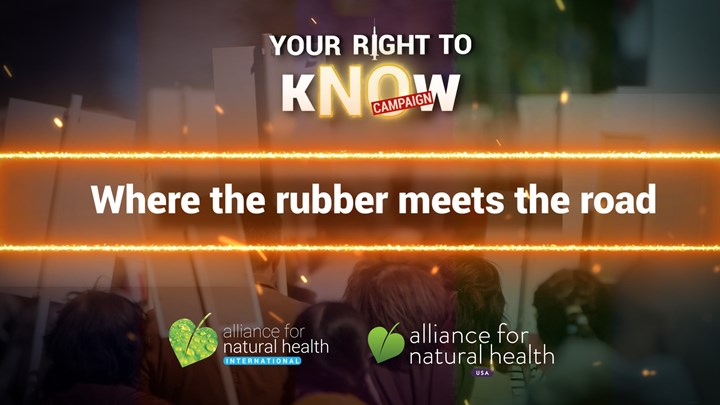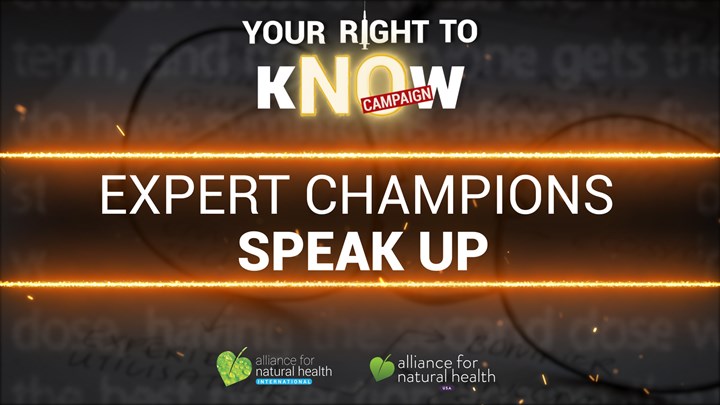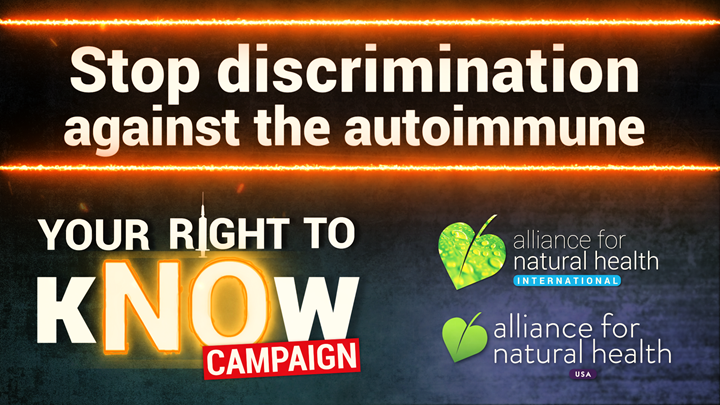Content Sections
Discrimination happens when vaccinated and unvaccinated people are allowed different rights
This is our third episode in our Right to kNOw campaign which aims to raise awareness over the potential for discrimination against those who are unable - or hesitant - for medical reasons, to receive a covid-19 vaccine. This week, including in our video (below), we look closer at the legal implications of the discrimination that increasingly means vaccinated and unvaccinated people have different rights and privileges.
Whilst we've targeted this campaign at a particularly large group that makes up at least 10% (and potentially considerably more than) of the population in industrialised countries — those that suffer from, or are at risk of, autoimmune disease — we fully acknowledge that there are many others who, for medical reasons, also feel that the covid-19 vaccines pose too great a health risk.
The covid-19 vaccines are not currently mandatory in many countries because, at least in part, they're being used under emergency use authorisations so are not yet formally approved or licensed. While governments are not currently in a position to mandate the vaccines, pressure is being brought to bear on citizens by other means. We're seeing companies changing contracts to mandate vaccines for employees, universities requiring students to be vaccinated before they can come back to campus, entertainment and sports venues demanding proof of vaccination for entrance and hearing too many stories of divided friends and families preventing contact with the non-vaccinated.
Add in to the mix sporting events also becoming vaccination sites, children and teens aged 12 to 17 in British Columbia being able to get vaccinated without parental knowledge. Let alone consent and reports of a pop-up vaccination centre, again in Canada, bribing kids with ice cream in exchange for a no-parental permission vaccine. You soon realise that there is absolutely no recognition or concerns about how discrimination against those who can't or don't want to vaccinate on medical grounds might play out in human rights terms.
At least in the USA, OSHA (Occupational Safety & Health Administration) has updated its guidance to employers over covid vaccine adverse events. If employers require employees to be vaccinated to maintain their job and they suffer an adverse reaction, then the event becomes both recordable and reportable, which opens the company up to liability. If the company only makes a recommendation (employees must have a truly free choice and not be penalised if they refuse), then OSHA will not enforce recording of any adverse events post-vaccination.
This week's video (below) walks you through some of the most important legal implications involved in riding roughshod over informed consent, why coercion might breach anti-discrimination laws and why institutions and companies also have a duty of care for citizens.
You can read more on the strong scientific and legal base to this campaign in our White Paper, published 13th May 2021. Now is the time for us to make a stand whilst these vaccines are still experimental. The powers-that-be are doing all they can to push the full vaccine licences through, but let's make sure that we do all that we can to ensure a win for the autoimmune as the evidence is so strong. It is our hope that this win will then pave the way for protecting many others.
How can you help? Visit our Right to kNOw campaign page and check out the section entitled, 'How you can support the campaign'! Send your emails to [email protected].
Note: You will see an advertising banner beneath our videos that play off the Brighteon platform (when they are not maximised). This advertising helps support the Brighteon platform that doesn't charge subscribers for their content, is committed to free speech, yet is also respectful of copyright-related law. We'd like to clarify that no advertising revenue from Brighteon is received by the Alliance for Natural Health Intl.
Transcript
All governments – whether national, regional or local, have a collective duty of care to do what they can to protect their citizens from existential threats like nuclear wars or new diseases – covid-19 being no exception. This is based on the principle of beneficence that’s enshrined in human rights treaties and law (here and here).
But based on available data of the risks of SARS-CoV-2 to different population groups and taking into account the still-experimental nature of current covid vaccines many countries have decided not to mandate covid vaccines at a national level.
What’s happened instead is that an ever-greater number of institutions and private companies have decided – sometimes as a result of their obligations to rules or laws passed by government authorities – to require students, staff or customers to have vaccines.
Unfortunately, this is something of a double -edge sword.
Potential risks
Risks from the virus as well as potential risks of adverse events from the vaccine appear to be greater among younger rather than older people. In fact, some employers are recognising the possibility that if a vaccine injury occurs because of their private mandate, it would go down as a workplace incident and render them liable. So some employers — such as the Chicago-headquartered US construction firm Clayco — have decided to reverse their vaccine mandates.
Not only this, a report by the Kaiser Family Foundation published in April 2021 suggests that vaccine mandates for staff might not be legal for vaccines that haven’t yet received full authorisation by drug regulators, such as the FDA in the USA, which is still the case for all covid vaccines.
Informed consent
Receiving consent from individuals before any kind of medical intervention is administered – vaccines included – is a legal obligation under the principle of respect for autonomy of persons. This includes being given adequate information to make an informed decision – without coercion. Yet it appears that many millions of people are being given vaccines without due regard for the legal requirements of informed consent.
In most countries that have yet to impose vaccine mandates, public or private coercion to vaccinate has now become almost ubiquitous.
Cause, effect and discrimination
What hasn’t received much public attention is that this kind of public or private coercion might breach anti-discrimination laws. This is particularly relevant where the affected party is one that has medical concerns over vaccination – such as those with an autoimmune history.
In our two previous videos in this series, we’ve explained why people with an autoimmune history have plausible medical reason, which could also be construed as a philosophical belief, against consenting to receive covid vaccines. As we lay out in our White Paper, there’s a clear mechanism for this — molecular mimicry — and now there’s also evidence of a covid vaccine-induced autoimmune signal. That comes in the form of the widely publicised adverse reaction that includes the potentially deadly combination of blood clots and low platelet counts. This autoimmune condition has been termed ‘vaccine-induced immune thrombotic thrombocytopenia’ or VITT.
Concerns might be greater for younger people, especially women, who statistically face greater risks, including their ability to have or raise children.
In effect, the potential for discrimination shares many of the concerns with those being voiced over vaccine passports. In the UK, the Equality Act of 2010 should prevent private entities from discriminating against those who’ve got plausible medical reason to avoid vaccination. In the US, the same protection is likely conferred by the Civil Rights Act and the Americans with Disability Act.
Duty of Care
The reality is that many institutions and private companies have yet to balance how they should manage their own duties and responsibilities against the country or region’s duty of care for the population as a whole – and this almost certainly won’t happen until more data are available and the courts in different jurisdictions have a had a chance to weigh in.
Right to kNOw!
Our Right to kNOw campaign is all about drawing citizens’, health professionals’, institutions’, companies’ and policy-makers’ attention to how people with autoimmune histories might face unfair and potentially illegal discrimination.
If you have an autoimmune history or you work with patients or clients who do – and you’re concerned about how those who choose not to be vaccinated might be discriminated against – please contact us as we’re documenting views and concerns both by citizens, and doctors and other health practitioners.
By airing these concerns and working together, we hope – as progressive and enlightened societies – we’ll be able to put a stop to discrimination against the 10% plus of the population with an autoimmune history.
Such discrimination can profoundly impact and disadvantage a person’s life and his or her future by limiting rights and civil liberties to a greater extent than those who’ve been vaccinated. This may be through reduced access to education, ability to work or be entertained, as well as by limiting freedom of movement.
Please share this video widely, go to our Right to kNOw campaign page – and find out how you can get involved. Thank you.
Read more about covid vaccines in our Covid Zone
Return to homepage








Comments
your voice counts
27 May 2021 at 9:30 am
Any form of discrimination is unacceptable, and discriminating against the 10% + who have legitimate medical reasons and concerns, and a right to say NO, is equally unacceptable.
27 May 2021 at 1:12 pm
Please correct me if I am wrong, but what I am seeing is a gradual slide from ethical and human rights reasons for refusing vaccinations, to medical reasons and the need for proof of an underlying medical condition.
As vaccines are not mandated in the UK, this government is using the ‘Problem, Reaction, Solution’ lever to bring about the outcome that they want.
PROBLEM.
Mandating is politically unpopular, we don’t do that in the UK, so they have created a ‘brainwashed, fear culture’ with a total lack of transparency in both the virus and the vaccination programme, they have created Project Fear.
REACTION.
The public are reacting in exactly the way that the government want. Through fear they are welcoming lockdowns, shielding, self isolation, social distancing, face masks and now vaccinations, because all these things are ‘Your passport to freedom.’
SOLUTION.
Introduce a vaccine programme. In just under 18 months since the start of this ‘plandemic’, this government has achieved nearly a totally vaccinated population without a single threat of mandatory vaccinations or mandatory passports. I believe that they have achieved a 60 million first dose take-up, the people are crying out for their vaccines and passports because it means they can go on holiday!!
For the government, exercise achieved!
They seem to be leaving the segregation of the public to organisations to be able to refuse entry to the unvaccinated, to public places and events without any laws or legislation being passed by government.
I personally think if more people had been told beforehand about possible serious side effects and when they arrive at their vaccination hub, that this vaccine is experimental and on a four year clinical trial, more people would have refused.
I maybe wrong.
27 May 2021 at 2:24 pm
A) Consider chemically sensitive people, who may very likely be *killed!* by injecting foreign material into their blood! Chemical sensitivity comes from detox compromise, a real physical condition, not in one's head. And yes the results surely do involve autoimmunity, thank you for your important campaign, ANH!
B) Then let's also consider how backward the assumptions are society wide. If the vaccines really were working, those who are vaccinated would have nothing to fear. So why send the unvaccinated to the back of the bus? In fact, it is the unvaccinated who are at risk, not the vaccinated....if the vaccines are working! Why is there this really ill-considered assumption that unvaccinated people pose a risk? If anything, given the statement on BigPharma's own handouts about the Pfizer and Moderna vaccines, if they merely reduce symptoms without reducing spread of disease, then the result is a Lot of "Asymptomatic Carriers" (to use the commonly invoked refrain) from the vaccines! It is in that case, the vaccinated who pose a real and present risk to others. And surely just walking around does Not make them murderers or criminals, as manipulatively and maliciously insinuated by those who have something to gain from such evil thought coaching. What heartlessness! Who is capable of this? Surely people of conscience couldn't even think this way, let alone talk this way.
C) BigPharma may be lying about the vaccines allegedly reducing disease symptoms. According to the studies I have read about here on the Pulse of Natural Health, the monkeys that died with blood and pus in their lungs after being exposed post-vaccine to the live virus, surely are no indication whatsoever of reduced symptoms.
D) Here in the USA to coerce any person without their full understanding or ability to understand, is a crime in the book of law. How can BigPharma get away with coercing children who are (in legal language) "not intelligent" of the vaccine side effects or potential thereof?
The criminality is smoking in our nostrils. It's just all an underscoring of the true fact that wherever there is "legal" immunity, the system will be very much abused and used for self-gain purposes. This gag order has to be undone, not only with regard to BigPharma but as general "legal" malpractice, across the board.
I hope that really good attorneys will find ways to beat the il"legal" and unconstitutional gag order called "legal" immunity", and slam the appropriate people in life prison.
Thank you for your work and we appreciate you, ANH.
Your voice counts
We welcome your comments and are very interested in your point of view, but we ask that you keep them relevant to the article, that they be civil and without commercial links. All comments are moderated prior to being published. We reserve the right to edit or not publish comments that we consider abusive or offensive.
There is extra content here from a third party provider. You will be unable to see this content unless you agree to allow Content Cookies. Cookie Preferences